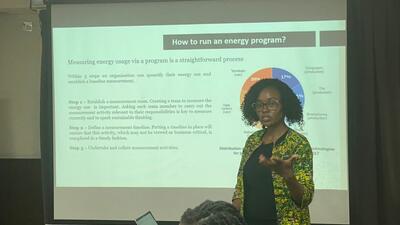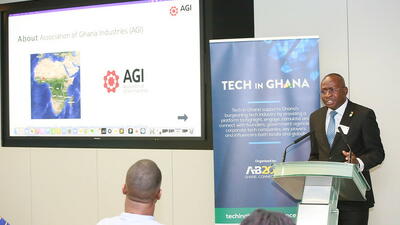
African tech companies show interest in ICT environmental sustainability
More and more people around the globe are becoming aware of climate change, and the impact human actions have on the environment. This awareness rose even more when the pandemic hit. At the same time the pandemic caused an acceleration of the digital world, due to working from home measures, restrictions on travel and interacting with clients and partners in person. The digital transformation is now accelerating even faster. With more people and businesses using an ever greater number of laptops, mobile phones, internet and therefore energy, our environmental impact now comes increasingly from Information and Communication Technology (ICT) sources. The ICT indstry’s carbon footprint account for 3% of global greenhouse emissions according to an article by 360ict. These emissions are predicted to rise to 14% by 2040[1].
Micro, Small and Medium sized Enterprises (MSME) represent around 90% of businesses worldwide and disasters such as Covid19 and climate change are one of the key threats to small businesses and the jobs they support. Between 40 and 60% of MSMEs do not survive a disaster. They can play a key role in turning around climate change, which will also increase their resilience in the face of future climate shocks or health pandemics[2].
What is ICT environmental sustainability and why is it important?
“Every year dozens of people die from poisoning linked to substances in electronic waste (e-waste).” says Julie Repetti, CEO of SetTIC, a tech startup supported by the NTF IV project in Senegal. Repetti has set up the first private company in Senegal for the management of electrical and electronic waste. Next to electronic waste, significant levels of energy are being used to both power electronics and cool huge data centres. Some improvements to make these processes cleaner are already being put in place. Google hosted a talk at the WebSummit 2020 where they explained that smarter data centres use less power for cooling. Google says they now optimise cooling systems with machine learning (AI), which results in 30% reduction in cooling.
In this context, ICT environmental sustainability means how ICTs can be produced and used in a more environmentally friendly way. When companies adopt policies to reduce their ICT environmental impact, they do not just lower their carbon footprint and become more resilient, they also reduce office costs and ensure their corporate social responsibility. The latter two are often mentioned as the main drivers to adopting sustainable policies by tech start-ups and SMEs in Africa, this came out of an ICT Sustainability survey launched by ITC’s #FastTrackTech Africa. Other benefits are anticipation of regulation and attracting investment. “Nowadays, the way a company manages its waste and particularly its hazardous waste is a reflection of its civic commitment and its seriousness,” noted Repetti. Finally, studies show that businesses who adopt and implement environmental sustainability policies improve their performance quite significantly[3].
Are tech start-ups aware of the issue and how could they do better?
The ICT Sustainability survey was created to better understand the ICT sustainability situation in the African technology sector, it was completed by almost 80 tech start-ups and SMEs in West and East Sub Saharan Africa between November 2020 and March 2021. It has provided valuable insights into the awareness, practices and needs of tech start-up managers and founders.
Only a small percentage (5%) of respondents rated their environmental impact negatively, but at the same time most of them did not have clear policies in place to manage their environmental impact (66% in West Africa, 52% in East Africa), 71% are not aware of their companies’ bandwidth consumption and only 15% comply with ICT-related voluntary sustainability standards such as ISO 14001, ISO 50001 or Utz certification.
The small businesses indicated electronic waste is the second highest residual they produce, after paper.
Up to 32% of respondents in East Africa and 50% of the respondents in West Africa indicated they manage their company’s electronic waste mostly by donating or selling the electronics. Almost none were aware of any existing recycling practices.
However, the survey also showed that the vast majority (97%) of tech start-ups and SMEs have an overwhelming interest in learning how to improve their companies’ ICT environmental sustainability practices. Electronic waste management, energy efficiency, sustainable data storage, and ICT sustainability standards were the areas of most interest. A lack of awareness and knowledge was a commonly cited as reasons why companies were not currently engaged in various environmental practices.
The #FastTrackTech Africa initiative of the International Trade Centre has responded to this need by developing a training curriculum, Greening ICT for tech SMEs, in partnership with Sustainable Business Consulting Kenya. Three training modules have been developed on (1) Electronic waste management, (2) energy efficiency & sustainable data storage, and (3) ICT sustainability standards.
After all, being trained and / or certified also “reflects a business’ CSR commitment and the company will be favoured over the competition. And a company that manages its waste well is synonymous to a responsible company.” – Repetti.


















